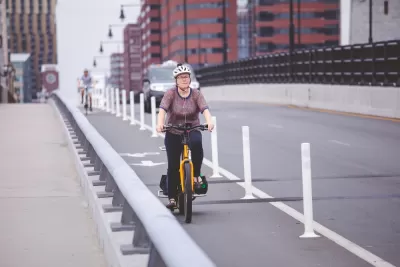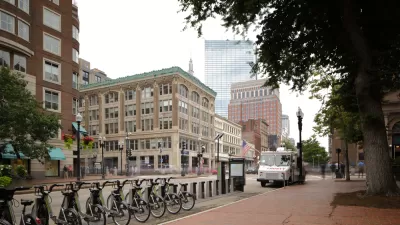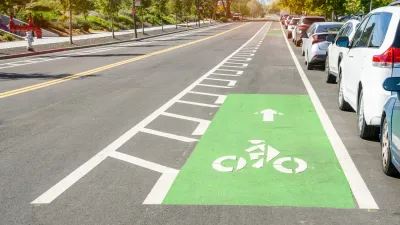The city plans to dramatically expand its bike lane network, add to its bike share fleet, and provide new e-bike subsidies to residents.

The city of Boston is rolling out a slew of programs to make biking in the city safer and more accessible, reports Grecia White for Streetsblog Mass. According to White, the city announced a major plan to expand its bike lane network alongside an expansion of the Bluebikes bike share system, e-bike subsidies, and educational programs.
“Leading by example is Mayor Wu who has begun biking to work in the recent weeks. She publicly shares the same safety concerns as others who bike in the city and she invites anyone from the community to join her as she rides from her neighborhood in Roslindale to City Hall in downtown Boston.” As White points out, “Safe, comfortable and accessible bike infrastructure is key for making city biking a positive experience.”
The article mentions the ‘pop-up’ bike lanes installed by the city in part due to the shutdown of the Orange Line, noting that the city’s stated goal is to “dramatically expand” its network of permanent bike lanes and put a “safe and connected bike route” within a 3-minute walk of half of Boston’s residents.
The city is also expanding the Bluebikes fleet by 500 bikes and plans to add 100 more stations to the system.
FULL STORY: Boston’s Exciting Biking Transformation: How the City is Promoting Biking on Multiple Fronts

Maui's Vacation Rental Debate Turns Ugly
Verbal attacks, misinformation campaigns and fistfights plague a high-stakes debate to convert thousands of vacation rentals into long-term housing.

Planetizen Federal Action Tracker
A weekly monitor of how Trump’s orders and actions are impacting planners and planning in America.

Chicago’s Ghost Rails
Just beneath the surface of the modern city lie the remnants of its expansive early 20th-century streetcar system.

Bend, Oregon Zoning Reforms Prioritize Small-Scale Housing
The city altered its zoning code to allow multi-family housing and eliminated parking mandates citywide.

Amtrak Cutting Jobs, Funding to High-Speed Rail
The agency plans to cut 10 percent of its workforce and has confirmed it will not fund new high-speed rail projects.

LA Denies Basic Services to Unhoused Residents
The city has repeatedly failed to respond to requests for trash pickup at encampment sites, and eliminated a program that provided mobile showers and toilets.
Urban Design for Planners 1: Software Tools
This six-course series explores essential urban design concepts using open source software and equips planners with the tools they need to participate fully in the urban design process.
Planning for Universal Design
Learn the tools for implementing Universal Design in planning regulations.
planning NEXT
Appalachian Highlands Housing Partners
Mpact (founded as Rail~Volution)
City of Camden Redevelopment Agency
City of Astoria
City of Portland
City of Laramie





























